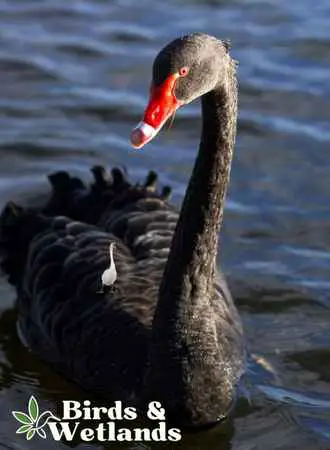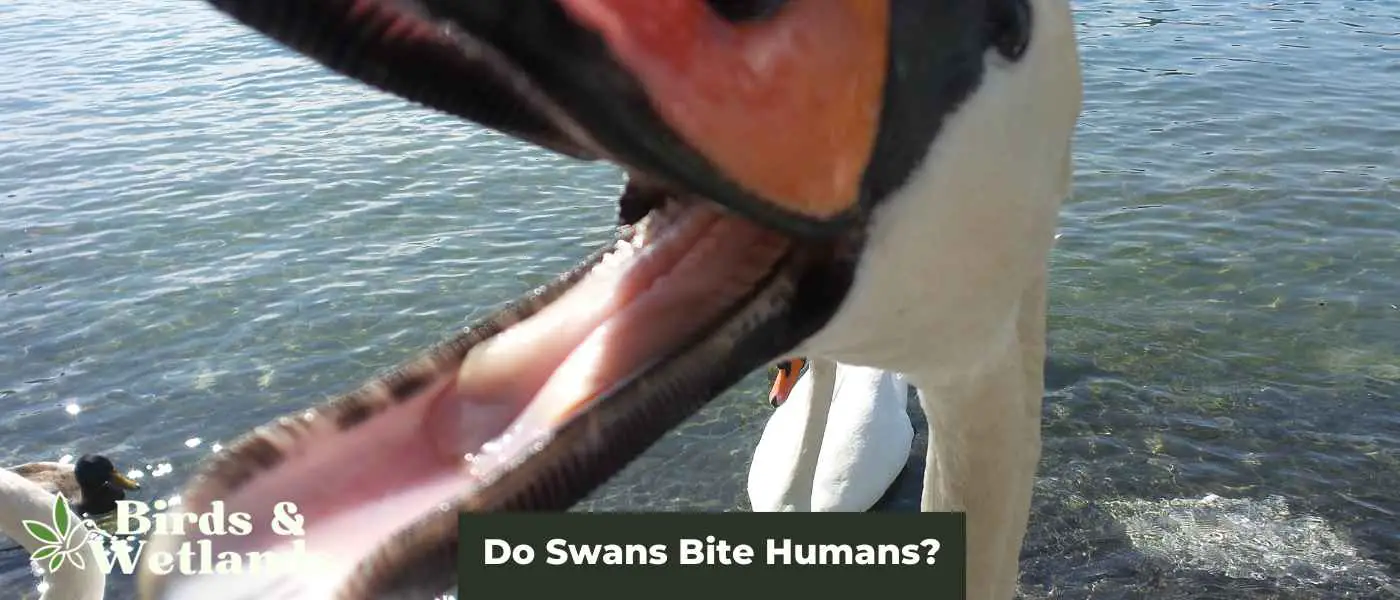Swans can exhibit aggressive behavior toward humans and other wildlife during the nesting season.
Nesting swans are particularly protective of their nests and young and will defend them against perceived threats. This behavior can include charging, chasing, and flapping their wings aggressively. But do swans bite?
Yes, all birds bite and swans are no exception. Biting is only one of the ways swans show their aggression toward a perceived threat. Humans that deliberately or unknowingly approach swans and their young may be on the receiving end of such hostility.
Key Takeaways on Do Swans Bite Humans
- Swans bite humans because they are very protective of their young and nest site.
- Swan injuries are usually aren’t serious but they can still cause mild pain and discomfort.
- The male swan is more aggressive than the female.
How painful is a swan bite?
While the bite force of a mute swan is not as strong as other creatures, it can still be quite painful. Swans have sharp beaks and strong jaws, which they can use to defend themselves if they feel threatened. They can also use their wings to strike and inflict injury.
A swan’s bite can cause minor cuts, puncture wounds, and bruises. If the bite is severe, it may require medical attention and can lead to infection if not properly cleaned and treated.
It’s important to remember that wild animals can carry diseases and should be treated with caution and respect.

Are swan bites dangerous?
Swan bites are not generally considered dangerous, but they can cause discomfort and skin irritation. Swans do not have teeth, so bites are usually more like a peck than a bite.
The pressure of the beak on the skin is usually enough to cause some pain and bruising. If it breaks the skin, the area may become infected. Though this is rare, it is important for anyone who a swan has been bitten to seek medical attention immediately as a precautionary measure.
When interacting with swans, it is important to remember that they are wild animals and should be treated with respect. If a swan appears threatened or irritated in any way, it is best to keep one’s distance as much as possible until the bird has calmed down again.
Swans will usually only attack if they feel threatened or believe their young are in danger. Therefore, it is important not to approach them too closely when there are young cygnets nearby.

Are swans aggressive to humans?
Swans generally are not considered dangerous to humans. They are large birds, but they are not typically aggressive toward people.
However, swans may become defensive of their nest sites during breeding season and attack if they feel threatened or if their young are in danger.
For example, there are a flock swans along River Cam that have been reported repeatedly attacking rowers. If a person gets too close to a swan’s nest, the swan may do wing flapping or chase or attack the person to protect its eggs or young. Similarly, if a person tries to feed or touch a swan, the bird may become agitated and bite or strike with its wings.
It’s important to note that swans are wild animals and should be treated respectfully. It’s also important to follow local laws and regulations regarding interacting with swans and other wildlife.
It is also important to note that swans can carry diseases like avian influenza and salmonella. Therefore, it is generally advisable not to touch or feed the swans.

Are swans dangerous to other animals?
Swans are not dangerous to other animals. These beautiful creatures are known to co-exist with other birds in their natural habitats, such as rivers, lakes and ponds.
However, like Canada geese and other waterfowl, swans can be territorial, especially during the mating season. Male swans, in particular, are aggressive and protective of their mates, nests and young ones. Their aggression is more about defending swan territory rather than antagonizing.
Swans aren’t at the top of the food chain which means they are prey to raptors and certain land mammals such as coyote, bears, foxes and uncontrolled dogs.

Do swans attack humans?
Swans are generally not known to attack humans, but there have been some reports of swans becoming aggressive in certain situations.
Swans are wild animals, and like all wild animals, they can be unpredictable. They can become aggressive if they feel threatened or if they are protecting their young.
For example, if a person gets too close to a swan’s nest, the swan may become aggressive to protect its eggs or cygnets. Similarly, if a person tries to feed a swan by hand, the swan may become aggressive because it sees the person as a potential threat.
It is also worth noting that most accounts of swans hurting people occur only because the birds were provoked.

What to do if a swan attacks you?
Swans are the largest waterfowl and are considered powerful birds. Protecting yourself against swan attacks is an important safety precaution to take, especially if you live in or near areas populated by swans, geese and ducks. While swans are generally peaceful birds, they can become aggressive if they feel threatened or disturbed.
Here are some simple tips you can follow to protect yourself from swan attacks:
- Avoid approaching a swan’s nest. Geese and swans are usually very protective of their young and may attack if they feel threatened. It’s best to keep a safe distance from the nest and not disturb them.
- Don’t try to touch or feed a swan. Although it may seem fun, it’s illegal in many areas and could result in an adult swan attack. Additionally, feeding wild animals is not recommended as it can cause them to depend on humans for food.
- Respect the bird’s space by keeping your distance and moving slowly around them. If you come across a swan while out walking or jogging, don’t turn your back on them, as this could be seen as a sign of aggression and cause them to attack. Instead, give the swans plenty of space, move slowly away from them, and avoid making direct eye contact with them at all costs.
- Wear protective clothing when engaging in activities near water where swans may present (such as sailing or kayaking). This includes wearing long trousers and sleeves (to protect from flapping swan’s wings), sturdy shoes/boots (for potential pecks), and waterproof material to reduce vulnerability should a physical altercation occur with the bird, which results in getting wet or soaked.
- Be aware of body language signals that indicate an impending attack, such as hissing, raised feathers, open wings, head shaking/jerking motions and loud honking sounds. These are all indicators that the bird feels threatened, so it’s wise to back off immediately if such behavior is noticed.
- Carry tools like air horns or whistles to scare away potential threats without hurting the mute swans. Blow into these devices to make loud noises and startle attacking birds without harming you or the wild animal.
How much damage can a swan do?
Swans have very strong wings and long necks, so they can deliver powerful blows with both. A swan attack may not cause a serious injury but can still cause mild pain and discomfort.
For example, the most common way swans attack humans is by using their wings or wing joint to chase them. This action is known as “wing-beating,” a defensive behavior that swans use to protect their nests, young, or territory. When a swan is wing-beating, it may also make loud honking noises.
Swans can also attack with their powerful beak. They may bite or peck at a person if they feel threatened or are trying to protect their young. In some cases, swans may also use their beaks to grab clothing or objects that they think may be a threat.
Can a swan break your arm with its neck?
Swans don’t attack people or other animals with their necks. Additionally, swans may be large and some of the heaviest flying birds but they are not strong enough to break bones. So an aggressive swan breaking an arm is myth. Although such an injury may be possible under certain circumstances, this large bird doesn’t cause serious harm.
Are black swans aggressive?
Yes, most swans are aggressive and that includes black swans.



